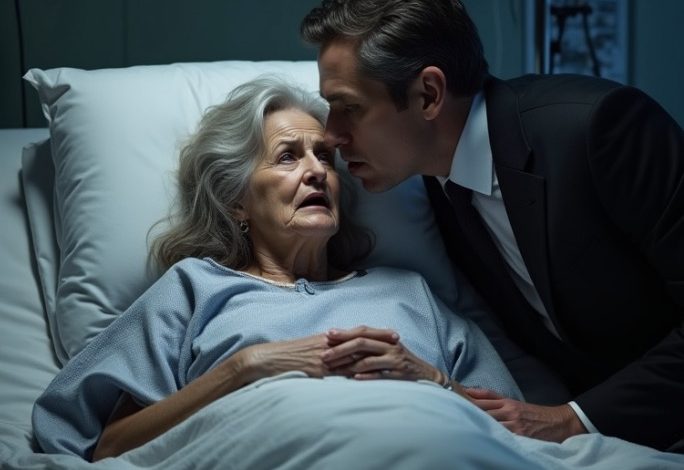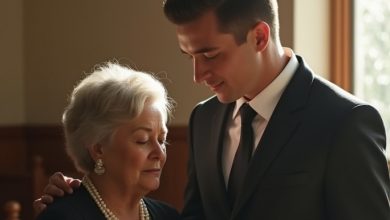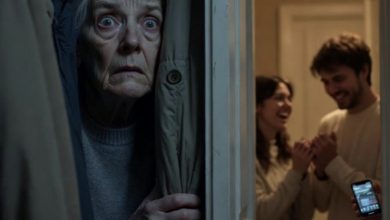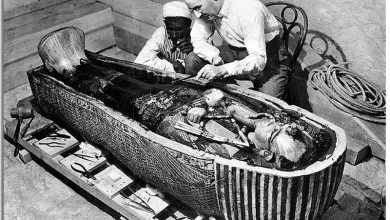“He Whispered ‘Protect Your Son Before It’s Too Late’—I Didn’t Believe Him Until I Saw My Name on a Document I Never Signed”

I was lying in a hospital bed, recovering after an accident, when the door suddenly opened. A man in a suit stepped inside. He looked completely out of place among the nurses in scrubs and the doctors in white coats. He didn’t touch my chart, didn’t glance at the monitors, didn’t ask how I was feeling. Instead, he came straight to my side, his steps quick and certain, his expression grave.
“Mrs. Henderson?” His voice was calm but carried a sharp edge.
I managed to nod. My throat felt dry, as if the air itself had been sandpaper.
He leaned closer, lowering his tone so only I could hear. “I don’t have much time. This may sound strange, but you must listen carefully.” His eyes flicked toward the door before returning to me. “Your daughter-in-law is going to tear your family apart. Help your son before it’s too late.”
The words hit me harder than the accident that had landed me there. My heart raced. “What? Who are you?” My voice came out weaker than I wanted, shaky, almost desperate.
But he didn’t answer. He straightened, glanced at the hallway once more, and said quietly, “Watch the papers. Trust your instincts.” Then, as quickly as he had appeared, he was gone. The door clicked softly behind him.
For a long time I stared at that door, unable to move, unable to think. Was this real? Or had the pain medication created some strange hallucination? I wasn’t sure, but the seriousness in his eyes stayed with me. That didn’t feel like a dream.
That night, while the machines hummed beside me and the fluorescent lights buzzed overhead, I couldn’t sleep. I kept hearing his words again and again: Watch the papers. Trust your instincts.
A week later, I was staying at my son Matthew’s house. On the surface, it looked like care, but it felt more like control. I wasn’t in my own bed, I wasn’t free to make my own choices. Amanda, my daughter-in-law, was everywhere—fluffing pillows, serving food, reminding me to take pills, adjusting my blanket as if I were a fragile child. At first, I told myself it was kindness. But then I began to notice the way she looked at me when she thought I wasn’t watching—a cold glint in her eyes, sharp and calculating.
Matthew seemed tired all the time. He loved me, I knew that, but he was caught between loyalty to his wife and affection for me. And Amanda was skilled—so skilled—in painting herself as the perfect daughter-in-law.
I tried to dismiss the unease that grew inside me, but then the phone rang.
It was Thomas Harrison, my lawyer of fifteen years. His voice was heavy, every word laced with seriousness. “Barbara, I need to see you as soon as possible. A document has surfaced—an amendment to your will.”
My heart turned cold. “That’s impossible. I haven’t changed my will in over three years.”
“That’s exactly the problem,” he said quietly. “This document is dated two weeks before your accident. It has your signature. But Barbara…” He hesitated, and I could almost see him rubbing his forehead the way he always did when something troubled him. “It doesn’t feel right. I’ve known you a long time. This isn’t like you.”
My hand trembled as I held the phone. The stranger’s words came back to me, clear as day: Watch the papers. Trust your instincts.
That night, I couldn’t eat. Amanda brought me dinner, smiling with that same false warmth, but the food sat untouched. I excused myself, claiming I wasn’t hungry. She tilted her head and gave me a look of pity that made my stomach turn.
After she left the room, I reached under my pillow and pulled out the napkin where I had drawn the stranger’s face back in the hospital. I stared at those lines—the sharp jaw, the tired but intent eyes. He had warned me. And now, the proof was surfacing.
Three days later, the document arrived in the mail. I waited until Amanda left for one of her yoga classes before tearing it open. My hands shook as I read.
It was worse than I imagined. The entire estate—my house, my savings, everything I had built for Matthew and my grandchildren—was to be transferred into a trust. Amanda was listed as sole trustee, with complete control if I became “incapacitated” or after my death.
And there, at the bottom, was my signature. Or something that tried to be my signature. To most, it would look convincing. But to me? No. The flourish on the “B” in Barbara was missing. For seventy-two years, I had signed my name with the same little curl at the top, a habit from my teaching days. This was a copy, a trace, a forgery.
At that moment, I knew without doubt: someone wanted to erase me, to strip me of my independence, my dignity, and my legacy.
The following morning, Amanda returned earlier than expected. She glanced at the desk, at the very drawer where I had hidden the forged will. Her eyes lingered there too long before flicking back to me. “Barbara, you shouldn’t be handling stressful paperwork. The doctor said memory problems are common at your age, especially after the accident. Let me take care of these things for you.”
Her tone was sweet, but underneath I heard it: the control, the manipulation.
That night, I bought a small leather notebook. By the dim light of my bedside lamp, I began documenting everything—her words, her actions, the pills she gave me, the visitors she kept away. Page after page, I wrote. The act of writing gave me back some control, reminded me of who I was, not who Amanda wanted me to be.
A few days later, I overheard Amanda with my grandchildren. I was standing quietly at the top of the stairs when I heard her voice floating up from the living room.
“Remember, Grandma is very tired. The doctor says she can’t handle too much noise. We shouldn’t bother her.”
I wanted to shout, to run down those stairs, but I held still. I saw my grandson Lucas glance up and catch sight of me. His face lit up. “Grandma!” he called.
But Amanda blocked him gently with her hand. “Not today, sweetheart. Grandma needs rest.”
My heart broke as I watched their disappointed faces. That night, my notebook entry was filled with anger. She is isolating me. She is cutting me off from my family, from my friends. She is creating the illusion of dementia while slowly stealing my life.
The turning point came when Patricia, an old friend, sent me a message. I had shown her the napkin drawing, and she had passed it to her nephew, who worked at the county clerk’s office.
He recognized the man immediately. His name was David Mitchell, a lawyer specializing in elder law.
But there was more. Twenty years earlier, he had been a troubled teenager arrested for drug possession. I remembered then, like a flash of lightning: I had been his teacher. I had defended him in court, telling the judge he deserved a second chance.
And now, decades later, he had come back to repay that act of faith.
David met me in a quiet park. His hair was grayer, his suit sharper, but his eyes still held the same fire I remembered. “You saved my life,” he said simply. “Now it’s my turn to save yours.”
He had already begun digging. Amanda’s past wasn’t as clean as she pretended. There had been another family in Oregon, another elderly woman who had “declined suddenly.” The pattern was the same: isolation, claims of dementia, legal control.
“You’re not her first,” David told me. “But if we act quickly, you can be her last.”
Together, we gathered evidence. My notebook. Medical tests proving the medications Amanda gave me were dangerous. Testimony from Dr. Chen, a specialist who confirmed I was of sound mind. Piece by piece, we built the case.
But David had one more instruction: “Pretend. Let her believe you’re still weak. Let her think she’s winning. She’ll get careless.”
So I did. I pretended to swallow the pills. I pretended to forget names, dates, moments. Amanda’s confidence grew. And then, one evening, I staged confusion so convincingly that she sighed with relief. That same night, I overheard her on the phone.
“Yes,” she whispered, her voice hushed but triumphant. “She’s getting worse. I think it’s time we place her in a facility.”
The next morning, I searched Matthew’s office and found the file: “Mom’s Care.” Inside were forged medical records, fake evaluations, and the final document—commitment papers for a long-term facility. My future, written without me.
The confrontation happened in the kitchen. I placed my phone on the counter, recording. “I know about the forgery, Amanda. I know about Oregon. I know about the commitment papers.”
Her smile faltered. “You’re confused, Barbara. You don’t know what you’re saying.”
“Oh, I know exactly what I’m saying,” I replied.
Her mask slipped, and venom filled her voice. “Do you think anyone will believe you? You’re just an old woman who forgets things. Matthew trusts me. Everyone trusts me.”
But she didn’t know Matthew was standing in the doorway. He had heard everything. Behind him, David entered with two police officers.
Amanda’s world collapsed in seconds.
Six months later, Amanda was in prison. Matthew and I had rebuilt our bond. My grandchildren filled my home with laughter again. And David… David had become not just my lawyer, but part of my family.
I sat at my kitchen table one quiet evening, my notebook open in front of me. Not the one filled with lies and betrayal, but a new one, filled with hope.
Today, I wrote, I remembered who I was. Not a victim. Not a confused old woman. But Barbara Henderson, a mother, a grandmother, a fighter. And I am alive.










